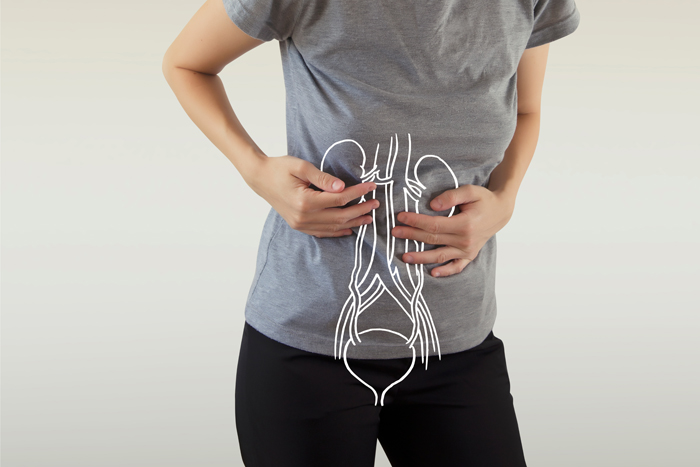KIDNEY DISEASES Treatment & Diagnostics in Chunni Ganj, Kanpur
KIDNEY DISEASES
The kidneys are two bean-shaped organs that rest on either side of your spine. The size of each kidney is the same as your fist. The kidneys perform the following functions: filter wastes from your body, balance your body's fluids, clean blood, and make urine. Kidney disease means your kidney is unable to filter wastes from your body as it should.
What is Kidney Disease?
Kidney Disease affects your kidney's ability to clean blood, filter wastes from your blood, balance your body's fluids, and make urine. Sometimes, it can also affect Red Blood Cell production and Vitamin D metabolism needed for bone health. When you have Kidney Disease, wastes and other unwanted fluids can build up in your body. That can cause several problems in your body like nausea, swelling in ankles, weakness, etc. Without treatment, the condition of your kidneys can get worse, causing kidney failure.

What are the symptoms of Kidney Disease?
Kidneys are very adaptable and can compensate for some of the problems that occur when you have Kidney Disease. So, your kidney gets damaged slowly, which is why your symptoms show slowly. Sometimes, you might not even feel the symptoms until the disease has advanced. Symptoms include:
- High blood pressure
- Nausea
- vomiting
- fatigue
- Metallic taste in the mouth
- Muscle cramps
- Swelling in ankles and feet
- Persistent itching
- Shortness of breath
What are the causes of Kidney Disease?
These problems occur when you have a significant blood loss, or your muscle tissue breaks down, or you go into shock because of severe infection.
- Acute Kidney Disease Causes- When your kidney stops functioning suddenly, it is called Acute Kidney Disease or Acute Renal Failure. Causes include:
- Insufficient blood flow to the kidneys
- Direct damage to kidneys
- Urine build-up in the kidneys
- Chronic Kidney Disease cause-When your kidneys don't work persistently for at least three months, it is called Chronic Kidney Disease. Your symptoms may not show until it's advanced. Diabetes and high blood pressure are the usual causes of kidney disease. High blood pressure causes wear and tear on blood vessels, including those that go to your kidneys.
When to see a doctor for Kidney Disease at Apollo Spectra, Kanpur?
The time to see a doctor in the case of Kidney Disease varies based on the condition of your kidneys. You should see a doctor when your symptoms are persistent or when the symptoms are new to you.
Request an appointment at Apollo Spectra Hospitals, Kanpur
Call 1860-500-2244 to book an appointment
How to Prevent Kidney Disease?
The two major threats to Kidney Disease are diabetes and high blood pressure. Therefore, you might want to focus on that and try to bring it under control. Many people are oblivious about whether they have got diabetes or high blood pressure. Managing diabetes and high blood pressure can save you from the extra wear and tear that they cause over time. Other things to prevent Kidney Disease include:
- Eating healthy diet
- Avoid smoking
- Avoid drinking
- Stay active
How to treat Kidney Disease?
The treatment of Kidney Disease depends on the severity of the disease. Some common treatments include:
- MEDICAL PROCEDURE
- Peritoneal Dialysis- is a medical therapy that replicates the function of kidneys. In this therapy, the natural lining of the abdomen is used as a filter to clean the blood when the kidneys can no longer do so.
- Hemo filtration- is a process where filters are used outside the body to clean the blood when the kidneys are damaged.
- Dialysis- is done using a machine to clean the blood when the kidneys can no longer do so.
- SELF-CARE
A healthy diet- is a diet that reduces the consumption of junk, non-veg, to treat Kidney Diseases. - MEDICATION
- Vitamins- supplements and vitamin-rich food that help with normal body functioning, growth, and development.
- Calcium Reducer- reduces the amount of calcium in the blood.
- Bone marrow supplement- helps bone marrow in producing new blood cells.
- SURGERY
A kidney transplant- is a procedure where the damaged kidney gets replaced with a normal one from a donor.
CONCLUSION:
It is crucial to diagnose a Kidney disease as it is one of the most deadly diseases. Consulting your doctor timely, undergoing proper treatment, and maintaining a proper diet can help you recover.
A healthy diet is necessary if you want to keep kidney diseases at bay. Have food packed with Vitamin C and incorporate blueberries, apples, sweet potatoes, kale, celery, spinach, and fish.
Usually, back pain occurs in the lower back due to posture issues. If you experience pain in the upper back on either side of the spine, beneath the ribcage, then it is due to problems associated with your kidneys.
There are high chances of encountering kidney failure with Kidney Disease. Hence, doctors advise patients to undergo a kidney transplant. Usually, after getting a stage 4 kidney disease, the life expectancy spans from 14 to 16 years.
Symptoms
Our Top Specialities
NOTICE BOARD
CONTACT US
CONTACT US
 Book Appointment
Book Appointment


.svg)
.svg)
.svg)
.svg)








